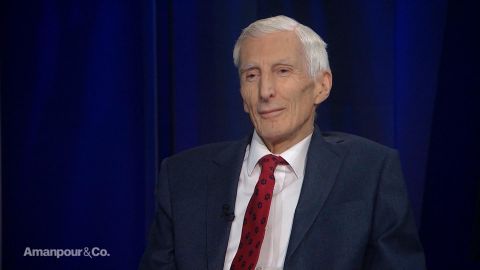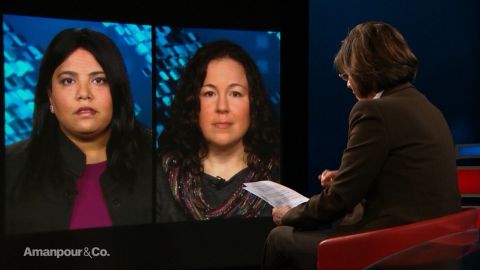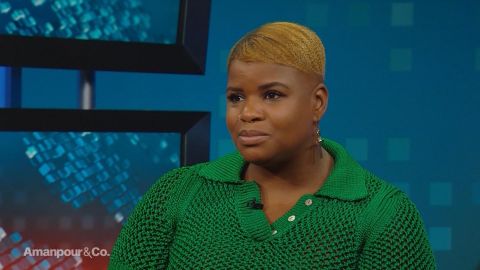Read Transcript EXPAND
CHRISTIANE AMANPOUR: Ericka Hart was diagnosed with bilateral breast cancer at the age of 28. A writer and sex-ed teacher, she realized that the cancer’s impact on her identity and even on her sex life did not feature prominently in her treatment. So Hart embarked on a mission to spark a broader conversation about the visibility of cancer survivors. And she sat down with our Alicia Menendez to talk about pushing boundaries, even going topless to make a point. Just to note, what you’re about to hear and see, it’s a frank discussion about sexuality that also contains some images that may not suit all viewers.
ALICIA MENENDEZ: Ericka Hart, welcome.
ERICKA HART, SEXUALITY EDUCATOR: Thank you.
MENENDEZ: You told Cosmopolitan, “I was raised to believe that sex is something you don’t talk about. I was raised to believe that sex is for someone else’s pleasure. I was raised to believe that sex is something that’s done in private.” How does that person become a sex educator?
HART: That person is a Sagittarius and loves to talk nonstop and really wanted the information. I asked a lot of questions in school. I didn’t really understand math. I asked lots of questions about math. I asked lots of questions about history, science. And then when I got to the little health class that was connected to the cooking class and the woodwork class, you know, like the ’80s and like in the ’90s, the teacher was like, you know, we’re just going to talk about abstinence and that’s it. And I said why are we —
MENENDEZ: This was growing up in Maryland?
HART: Yes, Maryland. Yes. Said why are we just talking about abstinence? The teacher is like, “Because we are. And you need to wait until you get married to have sex.” And I said why like why do I have to wait until I get — like really just like I don’t understand. She’s like, “It’s just the way it is.” And I was like that’s not sufficient. Like two plus two equals four because that’s how addition works but that doesn’t make sense to me.
So I went to my parents and they kind of gave me an explanation as to why they were saying that and explain sex to me as well. And then as I got older in middle school, my friends were having sex. And sex, — there’s woods that like surrounded my middle school and they were going out in the woods and having sexual breaks. And then getting STIs and some of them also got pregnant at a very young age. But they didn’t have the information to know what was happening to their body. Even during pregnancy, it was — it’s a problem now that you’re pregnant and now we’re going to disregard you as a human because you got pregnant at 15 so there goes your teenage years. But we’re not going to actually talk to you about postpartum or talk to you about what labor is going to be like or talk to you what the rest of your life is going to be. We’re just going to shame you. And I thought that that was wrong and I was really interested in not having it be a problem that people experience their bodies in those ways.
MENENDEZ: Do you believe that pleasure is political?
HART: Absolutely. All the way. Pleasure is absolutely political because, you know, as a black person, I didn’t necessarily — or a black fem rather, I didn’t necessarily experience desire until I was much older.
MENENDEZ: You didn’t experience desire and others were being desired?
HART: Being desired. Like I was — people were like I don’t really — there’s a guy that, you know, I loved. I will not say his name. I loved him in middle school and I’ll never forget it but it was me on one side of him and a white girl on the other side. He said, “I want to be with her.” And it didn’t necessarily hit me in the way of understanding the ways in which desire is political until I was much older is that she was the object of desire, not me. And everybody was kind of watching this courting of who is he going to choose. Like seriously, middle school is awful. Who is he going to choose? Who is he going to be with? And it’s like he chose her. And even in my heart of hearts I was like, of course, he’s going to choose her. She’s prettier than me. Quite naturally, she would be prettier than me and I was respected —
MENENDEZ: Because of her race?
HART: Because of her — yes, because of how she looked. Yes, absolutely. And it’s — but I have been receiving that messaging for a very long time. I mean Beauty and The Beast is not a black girl. Do you know what I mean? Like there’s lots of imagery where it’s not the black girl wins, you know, the prince. Sleeping Beauty, not a black girl. So it’s like you see these things over and over again and you don’t get how they impact you and that’s why you can’t talk about sex and gender without talking about race and about talking about class and talking about the systems or oppression that impacts us in this country. It’s just impossible.
MENENDEZ: How did you personally undo that?
HART: I don’t know that I undid it. I think that there’s awareness for it. I definitely have my own internalized anti-blackness where sometimes I’m like I don’t think that I’m pretty or maybe I shouldn’t wear my hair like this because people are not going to find it pretty. I actually used to wear my hair like this in high school and when I slipped it back, I was like I don’t know if I should do this. Maybe people won’t think that I’m attractive. Maybe I should wear headscarves. So I definitely have my own — it’s constantly undoing. I don’t think that there’s a — and now it’s undone. It’s just a constant conversation that has to happen.
MENENDEZ: Do you imagine a future where that’s not the case?
HART: Sometimes there’s a question who are you without racism. And I’m just being kind of pondering that question is like who am I without racism. And I feel like that’s that question I don’t really know. My intention as a black person is to still lift our narratives and to take up space and to disrupt what I can and with my platform and to continue to get uncomfortable and also make other people uncomfortable for — even if it’s a second that you’re uncomfortable, if you notice the discomfort, it’s a privilege. I live my life in discomfort. I don’t even notice that I’m uncomfortable anymore. So that’s why I’ve really — I think that there is hope that has me continue doing the work that I do in some ways whereas that I think hope has me like keep going.
MENENDEZ: Because do you believe that people can change or that institutions can change?
HART: I think that people can change. And then my hope is that the institution would change because the institution is nothing without the people. The people run the institution. So I think my hope is that people will see it like, “Wow, OK, I’m going to change this. I’m going to, you know, listen to the black fem in my office and make sure that she never experiences racism ever again and make sure that whoever is, you know, not paying attention will do something about it.” That’s my hope. That’s how I see it and that’s what moves my feet. That’s what gets me out of it.
MENENDEZ: You interrogate a lot of these intersections. When you were 28, you got diagnosed with bilateral breast cancer and a part of your critique of the medical institution and the care that you were given was that no one really talked to you about your sex life or your sexuality. What would it have looked like for them to have done that?
HART: Well, when you go to any doctor’s office, you have to fill out a, you know, a dissertation of papers and paperwork and sit down with doctors and fill them in on everything you’ve done in the past, you know, 10 years. And nothing involved like how I express my, you know, my sexuality or my sex life or what that looks like or where I’m experiencing pleasure and how I continue to. When we talk about breast cancer and double mastectomies, we also — we connect it to just cisgender women having breast and having some sort of like womanhood inside of their nipples but — and there are problems inside of that as well where this everybody has nipples and not every person that gets diagnosed with breast cancer is a cisgender woman but it’s also where is the conversation around pleasure and nipples. You know, like when that’s gone now, I don’t get to experience that. So doctor, can you help me of what have other people done or what have you suggested. You know, when I was on chemo, my libido completely drops because of the amount of hormones that were being pumped into my body. So I just — I didn’t know. And thank goodness I was in my Master’s program at the time for human sexuality so I had to bury and to kind of ask the questions of like this is weird and this is interesting that I’m experiencing this and I don’t want to have sex with my partner that I’ve had for — we’re about to get married and I don’t want to so what’s up. It’s like “Oh yes, you know, on the 18th page of the list of side effects for chemotherapy, you could experience, you know, a lack of libido. You could experience vaginal dryness. All of these things I wish were imparted to me when I went. You know, it’s like they tell you, you might be depressed, you’re going to have hair loss, and, oh my God, it sucks that you have cancer but you could also say your sex life may also be impacted.
MENENDEZ: Part of the way in which you thought your care was not totally culturally competent was as it related to sexuality. Part of it was also around being black. I want to read you something you told “Paper Magazine”. “Even though my mother passed away from breast cancer when I was 13, what came to mind when I thought about breast cancer was a middle- aged white woman with three kids, a beautiful stainless steel kitchen with a minivan and a summer home.”
HART: Yes.
MENENDEZ: Where does that idea come from?
HART: It comes from every breast cancer advocacy ad that ever exists. Still, to this day, I have not seen a major breast cancer ad that had black people at the forefront. What’s attractive is a white body. What’s disheartening is something happening to a white body. But it’s not necessarily disheartening if it’s happening to a black body because we’ve been conditioned to believe that things are just supposed to happen to black people.
MENENDEZ: We’re also conditioned to believe that black women, in particular, are stronger.
HART: Absolutely.
MENENDEZ: Which is just a disturbance.
HART: Right. So that’s a function of, you know, slavery that was instituted for so long is that oh, this is happening to them and they can handle it because they’re strong.
MENENDEZ: Right. You know, very recently the question of the racial gap and maternal health has come into prominence again because of Serena William sharing her story of childbirth and postpartum. And for a long time, there’s been this debate about why there is this racial gap and part of it has to do with systems of racial inequity within health institution.
HART: Absolutely.
MENENDEZ: But part of it, researchers are coming to believe and agree upon, has to do with the physiological stress that black women are constantly under simply as a product of living in American society.
HART: Yes, absolutely.
MENENDEZ: And so I wonder for you as someone who has gone through this experience if that manifest in your own journey.
HART: Yes. I mean the — it’s called weathering where you — you know, it’s not that you go in as a pregnant person that’s 30. You’re socially going as a pregnant person that’s six — with a body physiologically that’s 65. And I definitely think about that as someone who had a mother who died at 39 for breast cancer and no one ever talking to us about weathering or never — no one ever talking to us about the impacts, you know, emotionally that racism has on our bodies. You know, it’s that this incident happened and now it’s over. And now this incident happened and now it’s over but there’s no taking care of ourselves emotionally, spiritually of how that impacted us of living in a country where you’re constantly gas lit and led to believe that you don’t belong here, you know.
MENENDEZ: When you decided to get your bilateral mastectomy, you asked your doctor to show you images of other women who had had a bilateral mastectomy. Part of the challenge was finding pictures of a black woman or a black body that had had a bilateral mastectomy. And so in many ways, you took that into your own hands and became what you call a topless activist.
HART: Yes, yes.
MENENDEZ: What are you hoping to achieve with that?
HART: I just want to take up space. I want people to pay attention to how black bodies are being regarded. I think what happens a lot of times in this country is that we’re like, OK, Starbucks is being protested because they’re — they did something racist. And now it’s Starbucks, that’s the issue. And now, maternity health black mothers are dying inside a maternity health and we stick to this one thing that it’s like it’s an issue of maternity health. It’s an issue at Starbucks. It’s an issue in every institution in the U.S.
MENENDEZ: But isn’t part of the reason we focus on Starbucks and we focus on maternal health because if the target is that narrow, then it feels like maybe there’s something we can do about it.
HART: I mean I don’t know. I think the — I think we focus on those things so we can maybe have an article that goes viral because maybe the article won’t go viral if it’s just the all of the U.S. is racist. And every — it’s in every single institution and we could write about this every week. It could be literally the same article every single week, we have go. I think it should no longer be surprising that these spaces are racist. And I think me going topless is not just to take up space inside of breast cancer but that’s absolutely one of my reasons for it but it’s also so people pay attention. And oftentimes, I’ve sat in meetings where most of the people around me were white and expressed, you know, this doesn’t feel right and this seems like this is a function of racism or being the only black person in the room and people not listening to me. But all of a sudden, when I go topless, people see me. So I use that as a way to say, OK, you see me as topless. You’re shocked by this photo which is also a function of patriarchy and also capitalism that a feminine body can’t just be without a shirt but this man could be without a shirt on the internet, that’s completely fine. But I want people to pay attention to the picture and also to the message. So I don’t always have — you know, I post pictures, I don’t always say check your breasts. I’ll have, you know, something about what’s happening in the world because I want people to read it and I want people to see it. So just literally putting my body on the line.
MENENDEZ: Ericka, thank you so much.
HART: Thank you.
About This Episode EXPAND
Christiane Amanpour speaks with Anurima Bhargava and Samantha Harris about rules governing sexual assault on campus and Martin Rees about climate change. Alicia Menendez speaks with sexuality educator Ericka Hart.
LEARN MORE


